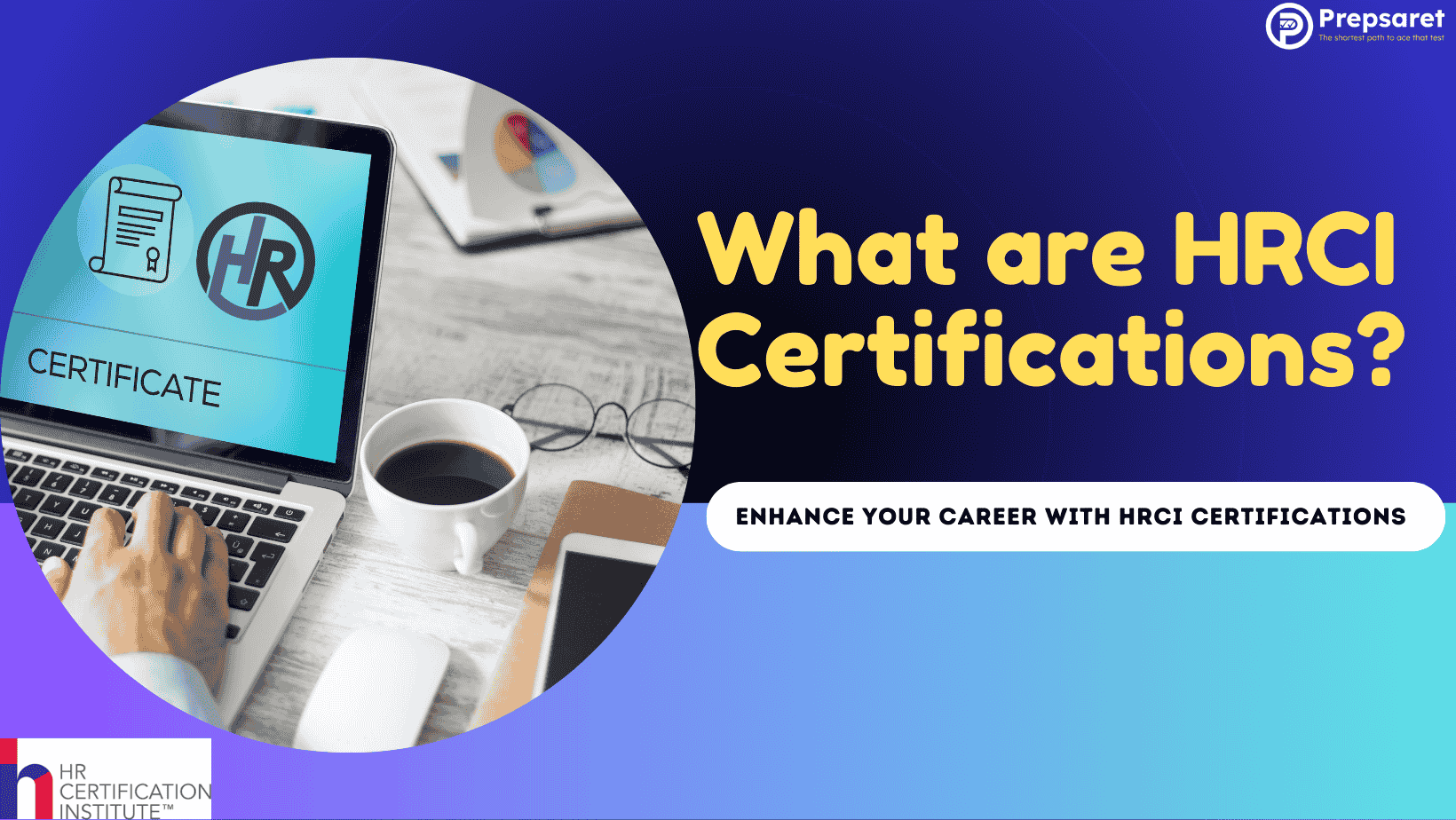Are you looking to advance your career in Human Resources? The Human Resource Certification Institute (HRCI) offers prestigious credentials that can boost your professional credibility and open doors to new opportunities.
If you’re preparing for an HRCI certification, Prepsaret offers high-quality study materials, including practice exams and study notes, to help you succeed. Start preparing today to maximize your chances of passing!
What Are HRCI Certifications?
HRCI certification represents a mark of excellence in the human resources profession. HRCI meaning revolves around professional validation in human resources. The Human Resources Certification Institute is a globally recognized, independent credentialing organization that provides certifications for HR professionals at various career stages.
Established in 1976, HRCI has certified over 500,000 professionals worldwide, making it one of the most respected HR credentialing bodies. HRCI offers several certification types, each designed for different experience levels and specializations within human resources.
These certifications validate your HR knowledge and demonstrate your commitment to the profession. Whether you’re just starting your HR journey or you’re a seasoned professional, HRCI has a certification that fits your career stage.
Advantages of Earning an HRCI Certification for HR Professionals
Obtaining an HRCI certification offers numerous benefits for HR career advancement credentials:
- Enhanced Credibility: An HRCI certification signals to employers and colleagues that you possess validated HR expertise and adhere to professional standards.
- Industry Recognition: HRCI credentials are respected worldwide, making them valuable for career advancement both domestically and internationally.
- Demonstrated Commitment: Earning and maintaining certification demonstrates your dedication to staying current in HR practices and continuous professional development.
- Competitive Edge: In today’s job market, HR certification can help you stand out among candidates when applying for positions or promotions.
The advantages of earning an HRCI certification for HR professionals extend beyond just the credential itself—they represent your commitment to excellence and professional growth in the field.
HRCI vs SHRM Certifications
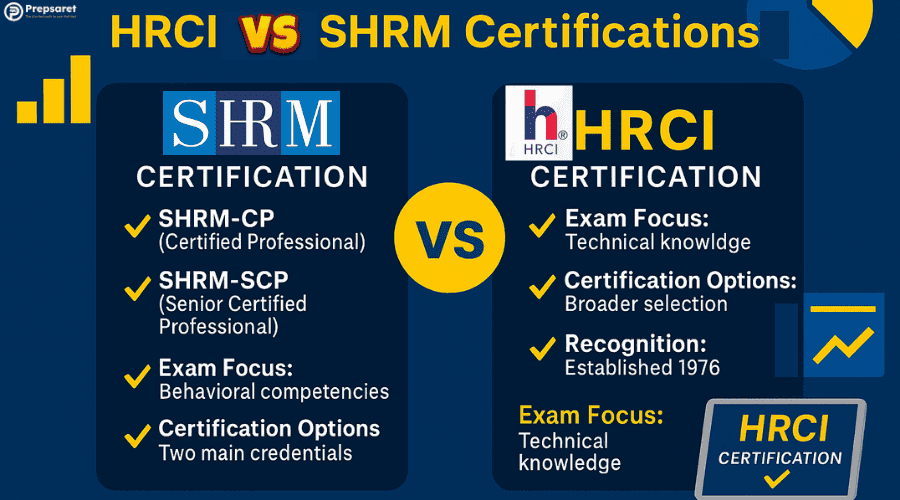
The field of HR credentialing has two major players: HRCI and SHRM. Understanding the differences between these organizations can help you choose the right certification path.
What is the Difference between HRCI and SHRM Certifications?
While both organizations offer accredited HR certifications, they differ in several important ways:
SHRM Certification is offered by the Society for Human Resource Management, which introduced its credentials in 2015. SHRM offers two main certifications:
SHRM focuses on a competency-based approach that emphasizes behavioral competencies and practical application of HR knowledge.
In contrast, HRCI certification has been around longer (since 1976) and offers a broader range of credentials. HRCI’s exam content emphasizes technical HR knowledge and compliance aspects, though it also includes behavioral components.
Key differences include:
- Exam Focus: HRCI exams tend to be more technical and knowledge-based, while SHRM exams focus more on behavioral competencies and situational judgment.
- Certification Options: HRCI offers more specialized certifications, including international options and an entry-level credential.
- Recognition: Both are widely recognized, but HRCI’s longer history gives it greater international recognition in some markets.
Which Certification Is Right for You?
Which HRCI certification is right for me? When deciding between HRCI vs SHRM, consider these factors:
- Career Stage: If you’re new to HR, the aPHR from HRCI might be your best starting point, as SHRM doesn’t offer an equivalent entry-level certification.
- Career Goals: Those pursuing specialized or international HR roles might prefer HRCI’s targeted certifications like GPHR.
- Employer Preference: Some organizations may value one certification over the other, so research what’s preferred in your target companies.
- Personal Learning Style: Consider whether you prefer HRCI’s technical knowledge approach or SHRM’s competency-based model.
Many HR professionals eventually obtain certifications from both organizations as they advance in their careers, finding value in what each offers.
Related post: PHR vs. SHRM
Types of HRCI Certifications
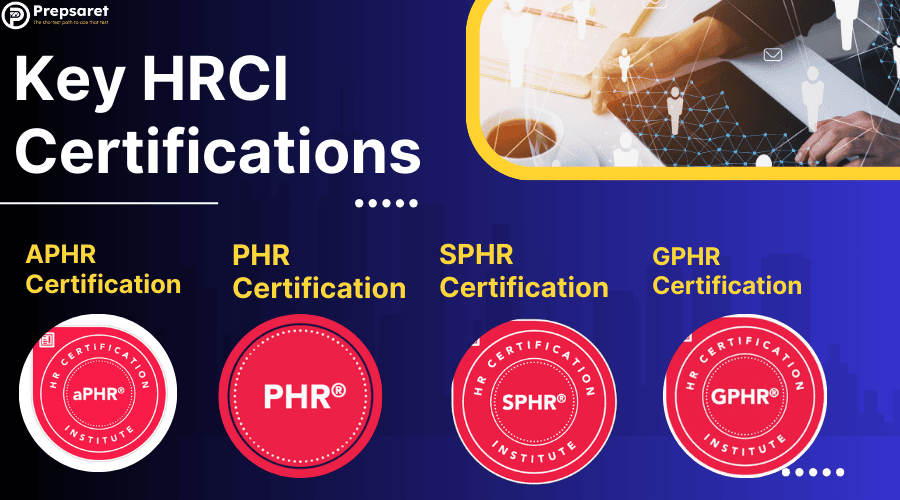
What are HRCI Certifications? HRCI offers a comprehensive range of certifications to match different career stages and specializations in human resources. Each certification targets specific knowledge areas and experience levels.
aPHR (Associate Professional in Human Resources)
The aPHR certification serves as an ideal starting point for those new to the HR field. This HR certification for beginners validates foundational knowledge of HR principles and practices.
Key features of aPHR certification:
- No experience requirement, making it perfect for recent graduates or those transitioning into HR
- Covers basics of employee relations, recruitment, compensation, benefits, and HR laws
- Serves as a stepping stone to more advanced HR certifications
- Demonstrates commitment to the HR profession even at an early career stage
The aPHR certification provides an excellent foundation for those looking to establish themselves in the human resources field.
PHR (Professional in Human Resources)
The PHR certification targets HR practitioners with operational and technical experience. This Professional in Human Resources (PHR) credential validates your competence in implementing HR programs and policies.
To qualify for the PHR, candidates typically need:
- At least one year of professional HR experience with a Master’s degree
- Two years of experience with a Bachelor’s degree
- Four years of experience with less education
The PHR exam covers key HR areas including:
- Employee and labor relations
- Business management
- Talent planning and acquisition
- Learning and development
- Total rewards
- HR compliance
This certification is ideal for HR professionals who handle day-to-day HR functions and want to demonstrate their technical HR expertise.
SPHR (Senior Professional in Human Resources)
The Senior Professional in Human Resources (SPHR) certification is designed for senior-level practitioners who develop HR policy and strategy. This credential validates your strategic and policy-making HR competencies.
SPHR candidates typically need:
- Four years of professional HR experience with a Master’s degree
- Five years with a Bachelor’s degree
- Seven years with less education
The SPHR emphasizes:
- Strategic planning
- HR leadership
- Organizational effectiveness
- Workforce planning
- Employee engagement strategies
This prestigious certification demonstrates your ability to align HR strategies with organizational goals and lead HR initiatives at the highest level.
GPHR (Global Professional in Human Resources)
The GPHR certification focuses on international HR practices and is ideal for professionals working in global HR roles. This Global Professional in Human Resources credential validates expertise in:
- Global HR strategy development
- Cross-border HR policies
- International assignments and relocation
- Global talent management
- Navigating international employment laws and regulations
- Managing diverse global workforces
GPHR candidates typically need substantial professional HR experience with global responsibilities. This certification is particularly valuable as organizations increasingly operate across international boundaries.
PHRi and SPHRi (International Certifications)
HRCI offers specialized international certifications for HR professionals working outside the U.S. or in multinational environments:
Professional in Human Resources – International (PHRi) targets operational HR professionals working outside the U.S. It validates competency in:
- HR administration
- Recruitment and selection
- Employee relations
- Compensation and benefits
- Learning and development
- Health, safety, and security
Senior Professional in Human Resources – International (SPHRi) is designed for senior-level international HR practitioners who develop HR policy and strategy across borders. It focuses on:
- International HR leadership
- Strategy development
- Organizational effectiveness
- Global talent management
- International employment law
These international HR certifications demonstrate specialized knowledge of global HR practices without being U.S.-centric.
Benefits of HRCI Certifications
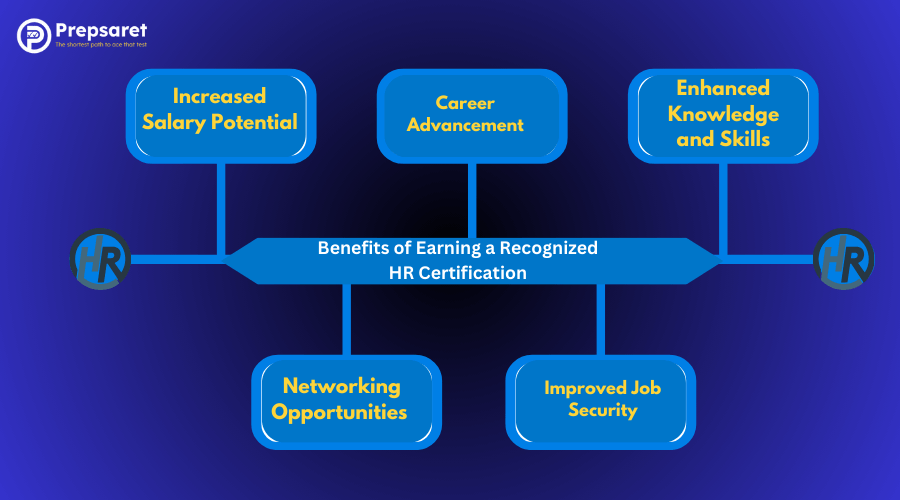
HRCI certifications offer tangible advantages that can transform your HR career trajectory. Let’s examine the key benefits these HR professional credentials provide.
Career Advancement and Job Opportunities
Earning an HRCI certification can significantly boost your career prospects:
- Expanded Job Opportunities: Many employers specifically seek candidates with HRCI credentials, with some job postings listing them as requirements.
- Promotion Potential: Certified professionals are often prioritized for leadership roles and advancement opportunities.
- Professional Distinction: HRCI certification helps you stand out in a competitive job market by demonstrating verified expertise.
- Networking Advantages: Certification connects you with a community of fellow certified professionals, creating valuable networking opportunities.
According to HRCI surveys, certified professionals report greater job satisfaction and career progression compared to non-certified peers.
Increased Earning Potential
One of the most compelling reasons to pursue HRCI certification is the potential salary benefit:
- Higher Salaries: Studies consistently show that HR professionals with HRCI certifications earn more than their non-certified counterparts. According to PayScale data, professionals with PHR certification earn approximately 5-7% more than non-certified peers, while those with SPHR certification can see salary premiums of 7-9%.
- Faster Salary Growth: Certified professionals often experience more rapid salary increases throughout their careers.
- Negotiation Leverage: Certification provides concrete evidence of your expertise, strengthening your position in salary negotiations.
When considering is an HRCI certification worth it from a financial perspective, the potential return on investment is substantial over the course of your career.
Global Recognition and Mobility
HRCI certifications offer significant advantages for international HR careers:
- Worldwide Recognition: HRCI credentials are acknowledged in over 100 countries, making them valuable for global mobility.
- International Credibility: Particularly with the GPHR, PHRi, and SPHRi certifications, you demonstrate expertise in global HR practices.
- Multinational Opportunities: Certification can open doors to positions with international organizations that value standardized HR credentials.
- Cross-Border Transferability: Unlike some country-specific HR qualifications, HRCI certifications have broad international acceptance.
For HR professionals with global career aspirations, HRCI international certifications like the Professional in Human Resources – International (PHRi) and Senior Professional in Human Resources – International (SPHRi) provide specialized credentials recognized across borders.
HRCI Certification Requirements
Understanding the specific requirements for HRCI certifications is essential before beginning your certification journey. Each credential has distinct eligibility criteria and exam formats.
Eligibility Criteria for HRCI Certifications
HRCI certification requirements vary based on the specific credential:
Associate Professional in Human Resources (aPHR)
- No experience required
- High school diploma recommended
Associate Professional in Human Resources – International (aPHRi)
- No experience required
- Designed for international HR practitioners
Professional in Human Resources (PHR)
- 1 year of professional HR experience with a Master’s degree
- 2 years with a Bachelor’s degree
- 4 years with a high school diploma
Professional in Human Resources – International (PHRi)
- 1 year of professional HR experience with a Master’s degree
- 2 years with a Bachelor’s degree
- 4 years with a high school diploma
Senior Professional in Human Resources (SPHR)
- 4 years of professional HR experience with a Master’s degree
- 5 years with a Bachelor’s degree
- 7 years with a high school diploma
Senior Professional in Human Resources – International (SPHRi)
- 4 years of professional HR experience with a Master’s degree
- 5 years with a Bachelor’s degree
- 7 years with a high school diploma
Global Professional in Human Resources (GPHR)
- 2 years of global HR experience with a Master’s degree
- 3 years with a Bachelor’s degree
- 4 years with a high school diploma
For California HR professionals, HRCI also offers the California-specific HR certification (PHRca) that focuses on state-specific employment laws.
Exam Format and Content
HRCI exams follow a structured format:
- Question Type: Multiple-choice questions
- Testing Method: Computer-based testing at authorized centers or remote proctoring
- Exam Length: Varies by certification (2-3 hours)
- Scoring: Scaled scoring method with passing scores typically around 500 on a scale of 200-700
Each certification exam covers specific knowledge domains:
aPHR Exam
- HR Operations (38%)
- Employee Relations (15%)
- Recruitment and Selection (15%)
- Compensation and Benefits (14%)
- Human Resource Development (12%)
- Health, Safety, and Security (6%)
PHR Exam
- Employee and Labor Relations (39%)
- Business Management (20%)
- Talent Planning and Acquisition (16%)
- Learning and Development (10%)
- Total Rewards (15%)
SPHR Exam
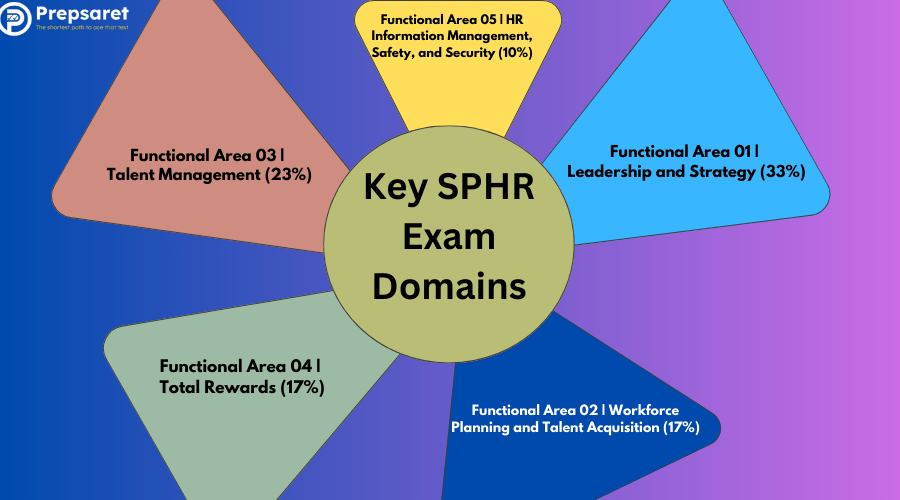
- Leadership and Strategy (40%)
- Employee Relations and Engagement (20%)
- Talent Planning and Acquisition (16%)
- Learning and Development (8%)
- Total Rewards (16%)
Related post: SPHR exam domains
The exams are rigorous and require thorough preparation across all knowledge domains.
How to Get Certified by HRCI
Obtaining HRCI certification involves a structured process from application to exam day. Understanding this process helps ensure a smooth certification journey.
Step-by-Step Guide to HRCI Certification
Here’s how to get certified by HRCI:
- Choose the Right Certification: Determine which HRCI certification aligns with your experience and career goals.
- Check Eligibility: Review the education and experience requirements to ensure you qualify for your chosen certification.
- Create an HRCI Account: Register on the HRCI website to access application materials.
- Complete Application: Submit your application with documentation of your education and work experience.
- Application Approval: Wait for HRCI to review and approve your application (typically 5-10 business days).
- Schedule Your Exam: Once approved, schedule your exam at a testing center or via remote proctoring.
- Prepare for the Exam: Study using recommended resources and free practice tests.
- Take the Exam: Complete the computer-based test at your scheduled time.
- Receive Results: Get your preliminary pass/fail result immediately after completing the exam.
- Recertification Process for HRCI Credentials: Once certified, fulfill continuing education requirements to maintain your credential.
The entire process from application to certification typically takes 2-6 months, depending on your preparation timeline.
Related post: How to Get PHR Certification
Preparing for the Exam
Effective preparation is crucial for HRCI exam success. The best study materials for HRCI certifications include:
- Official HRCI Handbooks: Provide exam content outlines and sample questions
- HR Textbooks: Cover fundamental concepts tested in the exams
- Study Guides: Offer focused content and test-taking strategies
- Practice Exams: Simulate the actual testing experience
- Flash Cards: Help with terminology and concept memorization
- Online Courses: Provide structured learning paths
Practice Tests
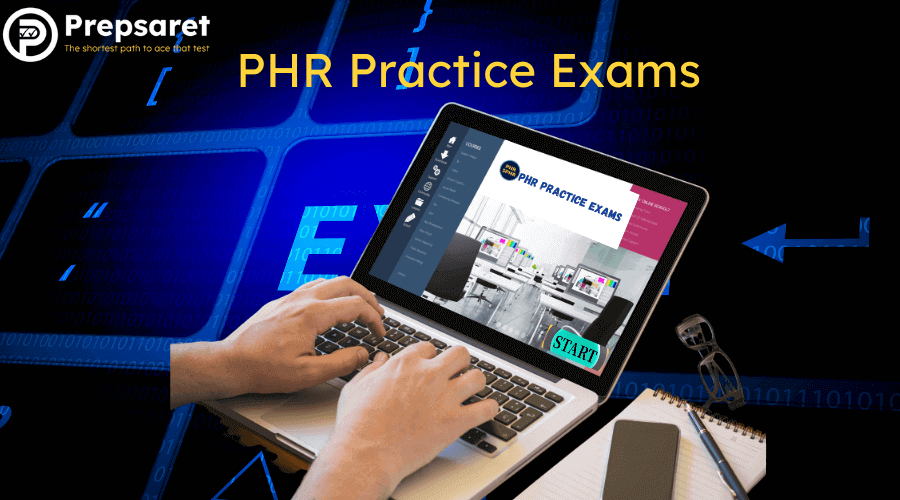
HRCI Practice tests are particularly valuable as they:
- Familiarize you with the exam format
- Help identify knowledge gaps
- Build test-taking stamina
- Reduce exam anxiety
Prepsaret offers comprehensive HRCI exam preparation resources, including practice test questions with detailed answers, study guides, and focused study notes that help you on how to prepare for HRCI certification exams efficiently.
Why Choose Prepsaret for HRCI Certification Exam Prep
When preparing for your HRCI certification, choosing the right study materials can significantly impact your success. Prepsaret stands out as a premier provider of HRCI exam preparation resources.
Prepsaret offers comprehensive study materials designed specifically for HRCI certifications, including:
- HRCI Practice Exams: Realistic questions that mirror the actual exam format and difficulty
- Study Guides: Focused content covering all exam domains
- Answer Explanations: Detailed explanations for both correct and incorrect answers to enhance understanding
- Performance Analytics: Tools to track your progress and identify weak areas
- Mobile-Friendly Platform: Study anytime, anywhere on your preferred device
What makes Prepsaret different is its diagnostic approach to exam preparation. The platform identifies your knowledge gaps and provides targeted materials to strengthen those areas, creating a personalized study experience that maximizes your study time efficiency.
Many successful HRCI certificate holders attribute their passing scores to Prepsaret’s comprehensive preparation materials. With regularly updated content that reflects the latest exam patterns, Prepsaret helps you approach your certification exam with confidence.
HRCI Certification Costs and Financial Aid
Understanding the full cost of certification helps you budget appropriately and evaluate the return on investment of your HRCI credential.
Cost Breakdown for HRCI Certifications
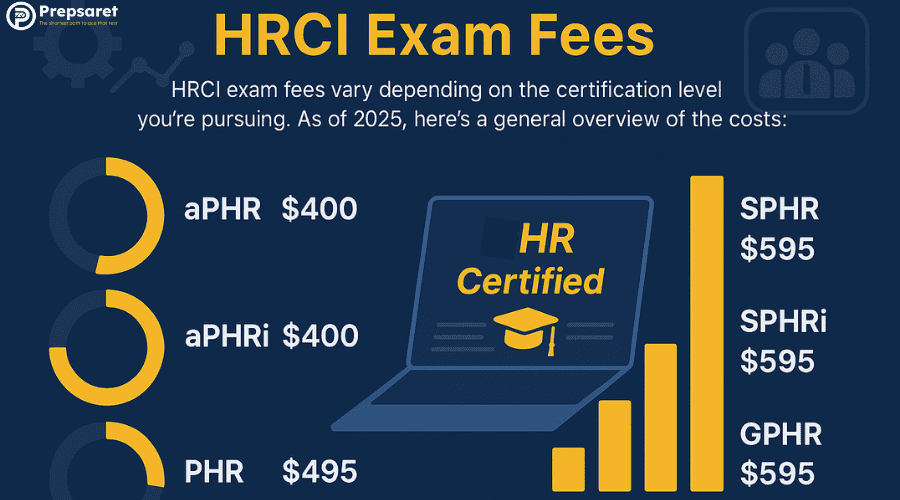
How much does an HRCI certification cost? HRCI certification cost varies by credential type:
Application and Exam Fees:
- aPHR: $400
- aPHRi: $400
- PHR: $495
- PHRi: $495
- SPHR: $595
- SPHRi: $595
- GPHR: $595
Related post: PHR Certification Cost
Additional Costs to Consider:
- Study materials: $200-$800
- Preparation courses: $500-$1,500
- Recertification fees (every 3 years): $100-$150
- Continuing education: Varies based on activities
The HRCI Human Resource Associate Professional Certificate (aPHR) represents the most affordable entry point, while advanced certifications like the SPHR and GPHR command higher fees.
Some employers offer partial or full reimbursement for certification costs, recognizing the value these credentials bring to the organization. Professional development funds, educational stipends, or tuition assistance programs may cover certification expenses.
Related post: SPHR Certification Cost
Return on Investment (ROI)
Is an HRCI certification worth it? When evaluating what are HRCI certifications worth it from an ROI perspective, consider these factors:
- Salary Premium: Certified professionals earn 5-9% more on average, potentially translating to thousands of dollars annually
- Career Advancement: Faster promotion timeline and access to senior positions
- Job Security: Enhanced marketability during organizational changes or industry downturns
- Professional Network: Access to a community of certified professionals for opportunities and knowledge sharing
For many HR professionals, the lifetime earnings increase far outweighs the initial investment in certification, making HRCI credentials a sound financial decision for career development.
HR Certification Programs for Beginners
Starting your HR certification journey can seem overwhelming, but entry-level options make it accessible even for newcomers to the profession.
Best Entry-Level HRCI Certifications
For those seeking Human Resource certifications for beginners, HRCI offers excellent options:
Associate Professional in Human Resources (aPHR):
- Designed specifically for those new to HR or still in college
- No experience requirements
- Focuses on foundational HR knowledge
- Covers the essential functions of HR departments
- Provides a credential while gaining experience
The aPHR serves as a stepping stone to more advanced certifications like the PHR once you gain professional experience. It demonstrates to employers your commitment to the HR field and a baseline of knowledge that makes you valuable even as an entry-level candidate.
Getting Started in HR
For beginners looking to earn their first HR credential:
- Start with Research: Understand the different certification options and requirements.
- Choose aPHR or aPHRi: Begin with the Associate Professional in Human Resources certification that doesn’t require prior experience.
- Create a Study Plan: Set aside regular time for preparation, typically 2-3 months for entry-level exams.
- Utilize Various Resources: Combine textbooks, online courses, study groups, and practice exams for comprehensive preparation.
- Take Practice Tests: Use resources like Prepsaret to familiarize yourself with the exam format and identify knowledge gaps.
- Join HR Communities: Connect with other aspiring and established HR professionals for support and insights.
- Apply Early: Submit your application well before your planned exam date to allow time for approval.
Starting with an entry-level certification builds confidence and creates a foundation for more advanced credentials as your career progresses.
HRCI Exam Preparation Tips
Proper preparation significantly increases your chances of passing your HRCI certification exam on the first attempt. Here are proven strategies to help you succeed.
Effective Study Strategies
Implement these HRCI exam preparation tips to optimize your study time:
- Create a Schedule: Develop a realistic study timeline based on your exam date, typically 2-4 months for thorough preparation.
- Break Down Content: Divide the material by knowledge domain and allocate time proportionally based on exam weightings.
- Use Multiple Learning Methods: Combine reading, practice questions, discussions, and teaching concepts to others for deeper understanding.
- Focus on Weak Areas: Identify challenging topics through practice tests and dedicate extra time to mastering them.
- Review Regularly: Schedule periodic review sessions of previously studied material to reinforce learning.
- Apply Concepts: Connect theoretical concepts to real-world HR scenarios you’ve encountered or might face.
- Manage Stress: Incorporate breaks, exercise, and relaxation techniques into your study routine to prevent burnout.
- Join Study Groups: Collaborate with others preparing for the same exam to share insights and explain concepts to each other.
Consistent, focused study is more effective than cramming sessions right before the exam.
Utilizing Practice Tests and Study Notes
Practice tests are invaluable preparation tools:
- Diagnostic Assessment: Take a full practice test early in your preparation to identify knowledge gaps.
- Regular Testing: Incorporate weekly practice quizzes on specific domains to track progress.
- Full-Length Simulations: Complete at least 2-3 full-length practice exams under timed conditions before your actual exam.
- Review Missed Questions: Thoroughly analyze incorrect answers to understand underlying concepts.
- Create Condensed Notes: Synthesize key concepts into concise study notes for efficient review.
Prepsaret’s practice tests and study notes are specifically designed to simulate the HRCI exam experience, helping you build both knowledge and test-taking confidence. Their materials are continuously updated to reflect current exam content and format.
Read more: PHR Exam Prep Course
FAQs About HRCI Certifications
What's the Difference Between HRCI and SHRM Certification?
HRCI focuses more on technical HR knowledge and compliance, offering multiple certification levels including specialized and international options. SHRM emphasizes behavioral competencies with just two certification levels (SHRM-CP and SHRM-SCP) and a competency-based approach to HR practice.
How Do I Get My HRCI Certification?
To obtain HRCI certification, determine which credential fits your experience level, submit an application with documentation, receive approval, schedule your exam, prepare thoroughly, pass the computer-based test, and maintain your certification through continuing education.
What is the Best HR Certification to Have?
The best HR certification depends on your career stage and goals. Entry-level professionals benefit from aPHR, mid-career practitioners should consider PHR or SHRM-CP, while strategic HR leaders may pursue SPHR or SHRM-SCP for maximum career impact.
Is It Better to Have SHRM or PHR?
Neither is universally "better" – PHR demonstrates strong technical HR knowledge and compliance expertise, while SHRM-CP reflects behavioral competencies and practical application. Many professionals eventually obtain both to showcase comprehensive HR capabilities.
Does SHRM Accept HRCI Credits?
Yes, SHRM accepts some HRCI recertification credits, though not all activities qualify for both programs. SHRM recognizes many HRCI-approved activities for Professional Development Credits (PDCs) toward SHRM recertification, facilitating dual certification maintenance.
Start Your HRCI Certification Journey Today!
HRCI certifications represent a valuable investment in your HR career, enhancing your credibility, expanding opportunities, and potentially increasing your earning potential. From the entry-level aPHR to the strategic SPHR and global GPHR, these credentials validate your expertise and commitment to the HR profession.
Start preparing for your HRCI certification exams today with Prepsaret’s comprehensive study materials and practice tests. Gain the knowledge and confidence you need to succeed!

